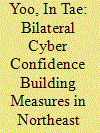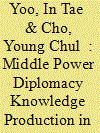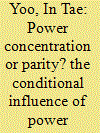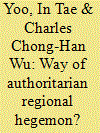|
|
|
Sort Order |
|
|
|
Items / Page
|
|
|
|
|
|
|
| Srl | Item |
| 1 |
ID:
188865


|
|
|
|
|
| Summary/Abstract |
Under what conditions do countries form confidence building measures (CBMs)
in the cyber domain? How do those conditions affect the frequency and type of
cyber CBMs (CCBMs)? The extant literature surveys existing CCBMs, providing
fragmented pictures of them at either the global, regional, or bilateral levels.
Thus, there is a lack of systematically comparative perspectives between multiple
efforts for states’ cyber confidence–building. This deficiency implies that little
to no research has been dedicated to analytical examinations of the development
of CCBMs. The present article offers a framework to assess the development
and theoretical arguments to understand its underlying causes. It argues that the
willingness of political leaders affected by the international strategic–security
context is a necessary condition, in addition to the cost-benefit calculation of
policymakers, affecting the frequency and type of CCBMs. To examine the
arguments, the present article overviews the global development of the discussion
of CCBMs at the UNGGE and OEWG. Then it presents the networks of CCBMs
in Northeast Asia where the staunchest alliances as well as fierce strategic–security
competitions have taken hold in the emergence of the new cyber domain. Lastly,
the article investigates the processes of bilateral CCBMs formation in three dyads
between the United States and each of three states, namely, Russia, China, and
Japan. The empirical findings support the theoretical arguments
|
|
|
|
|
|
|
|
|
|
|
|
|
|
|
|
| 2 |
ID:
187972


|
|
|
|
|
| Summary/Abstract |
In this article we examine the ways in which middle power diplomacy (MPD) knowledge is produced in the South Korean IR community, specifically in the context of critical IR studies. In doing so, we attempt to address the questions of who produces MPD knowledge, why, for whom, and for what purposes, while also identifying the meta-theoretical underpinnings of MPD knowledge. Our critical review of the literature suggests that current South Korean MPD knowledge is a Korean version of hegemonic stability theory, which aims to secure the US liberal hegemony in world politics. We therefore argue that South Korean MPD knowledge may limit South Korea’s agency in IR as well as its scholarly thinking space for discerning novel ways of peacefully coexisting with others and sensing possible systemic transformations of global politics.
|
|
|
|
|
|
|
|
|
|
|
|
|
|
|
|
| 3 |
ID:
153125


|
|
|
|
|
| Summary/Abstract |
Which condition between power concentration and power parity among regional countries is conducive to regional economic integration? The literature has suggested mixed findings as to the influence of power distribution. This study examines conditional effects of power distribution by identifying associated conditions to produce formal regional economic integration. Based on the comprehensive data on plurilateral trade agreements, this study employs both fuzzy set Qualitative Comparative Analysis (fsQCA) and process tracing techniques. The fsQCA reveals multiple jointly sufficient conditions to the outcome. In particular, I focus on two such conditions: (1) the presence of a regional hegemon with surrounding countries of homogeneous polity type and (2) the strong intraregional trade interdependence in conjunction with power parity among countries. These conditions are further supported in within-case analyses. These results indicate the conditional effect of power distribution and the existence of multiple paths toward regional economic integration.
|
|
|
|
|
|
|
|
|
|
|
|
|
|
|
|
| 4 |
ID:
186843


|
|
|
|
|
| Summary/Abstract |
How has China contributed toward the conclusion of the Regional Comprehensive Economic Partnership (RCEP)? The extant literature tends to either undervalue China’s role or emphasizes the absence of China’s willingness to realize the RCEP. However, it is difficult to form region-wide multilateral preferential trade agreements (PTAs), such as RCEP, without any significant contribution from a regional hegemon, such as China. This paper, thus, argues that China has contributed significantly toward the conclusion of RCEP by engendering incentives for member countries to join through multiple cooperative structures. These cooperative structures involve China-led bilateral PTAs and international development forums, which include the Belt and Road Initiative and Asian Infrastructure Investment Bank. With the gradual shift from bilateral to multilateral PTAs and forum-linkage strategies, China turned to be more assertive in concluding the RCEP than in the early years of RCEP negotiations, as evidenced by the discourse of political and opinion leaders.
|
|
|
|
|
|
|
|
|
|
|
|
|
|
|
|
|
|
|
|
|